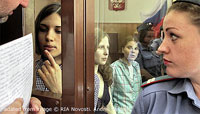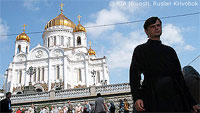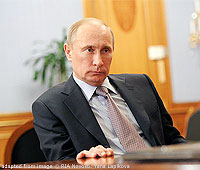Kremlin Behind Pussy Riot Trial. Or Is It the Church?
Alexander Bratersky, Nikolaus von Twickel - Moscow Times - themoscowtimes.com - 8.16.12 - JRL 2012-147
On Jan. 20, Federal Guard Service officers detained eight members of an obscure female punk band after they staged a daring performance on Red Square in which they denounced the "sexist regime" of Vladimir Putin. The young women were fined 500 rubles ($16) for violating public order and released.

file photo

file photo

file photoA month later, five members of the same band and an associated activist sneaked into the Christ the Savior Cathedral, where four group members lip-synched a song called "Mother of God, Cast Putin Out!" in front of the iconostasis.
That performance, compiled with footage from another church, subsequently became the "punk prayer" that laid the basis for Pussy Riot's world fame.
When Moscow's Khamovnichesky District Court delivers a verdict Friday on band members Nadezhda Tolokonnikova, 22, Maria Alyokhina, 24, and Yekaterina Samutsevich, 30, most experts expect that judge Marina Syrova will fulfill orders from the Kremlin rather than following the law.
Observers are divided, however, regarding the reasons for authorities' prosecution of the young women.
The three women are accused of hooliganism motivated by religious hatred, charges that carry a maximum sentence of seven years in prison. They have been held in detention since March.
Analysts said they were convinced that the case was politically motivated, although some view the church as having pushed for the charges rather than the state.
Evidence for a political motive behind the charges comes not only from the two-week-long court hearing, which prompted comparisons to Soviet show trials, but also from the behavior of law enforcement agencies in the case.
Of the three women in court, only Tolokonnikova and Alyokhina actually took part in the Feb. 21 performance, Tolokonnikova's lawyer Mark Feigin said.
"Samutsevich was stopped by church staff when she tried to bring a guitar into the cathedral," he said.
Police also arrested Tolokonnikova's husband, Pyotr Verzilov, together with his wife and Alyokhina on March 3, but released him shortly thereafter, despite the fact that he had also been in the church during the performance.
Feigin suggested that investigators dropped plans to accuse Verzilov of organizing the performance because he has dual Russian and Canadian citizenship.
"They feared an international scandal," he said, explaining that there also would have been no one to care properly for Verzilov's and Tolokonnikova's young daughter.
Investigators decided to go after only the three Pussy Riot members, even though they know the identities of all six activists who were in the church, the lawyer said.
"They decided not to turn the defendants' bench into a stage. Their aim is to show the authorities' reaction to those kinds of actions," he said.
Feigin suggested that the trial was orchestrated by Kremlin hard-liners, the so-called siloviki, connected to the Russian Orthodox Church.
But the church itself appears to be divided about the case. Father Gleb Yakunin, a long-standing critic of the Moscow Patriarchate, laid blame on Russian Orthodox Church head Patriarch Kirill.
"Putin even called for a soft verdict, while it was Kirill who felt insulted," Yakunin said by telephone.
Putin told reporters in London on Aug. 3 that the Pussy Riot members should not be judged "too harshly."
Church officials have said repeatedly that the Patriarchate would not interfere with the trial.
Andrei Zolotov Jr., a RIA-Novosti journalist who closely follows the Orthodox church, said that while it would be impossible to prove who was directing the trial, it was clear that it had already severely damaged the church's image.
"There surely is irritation and discontent within the church hierarchy about the length of the pretrial detention," he said, adding that relations between Putin and Kirill were "far more complicated" than the close alliance often portrayed in the media.
While Pussy Riot's song in the Christ the Savior performance did insult Kirill by calling him a vulgar name, the band members have made clear that their primary aim is political change.
During the trial, they apologized to Orthodox believers and said they were motivated not by religious hatred but by church leaders' meddling in politics.
After their January performance on Red Square, Pussy Riot said the square should be occupied to achieve political change.
"It's the equivalent of Tahrir for Russia," group members said in an e-mail interview with The St. Petersburg Times, referring to the Cairo square where Egyptians gathered to protest the regime of dictator Hosni Mubarak in January 2011.
But the pictures of young mothers Alyokhina has a young son languishing behind bars for months do not damage the church so much as they undermine the government's long-running efforts to improve the country's image abroad.
Putin told a meeting of Russia's foreign ambassadors last month that more work should be done to improve the country's "distorted" image internationally.
A study by the Pew Research Center found that Russia's image has deteriorated in many Western countries, with the share of those holding a positive view of the country dropping from 49 to 37 percent in the United States and from 47 to 33 percent in Germany, Kommersant reported earlier this month.
Pundits have offered a range of explanations for this seemingly self-destructive course of action.
Vladimir Pribylovsky, the head of the Panorama think tank, argued that the Kremlin can benefit by underscoring some of the opposition's more radical tactics.
"This can be very good for domestic public opinion," he said.
A more eccentric theory was offered recently by Father Andrei Kurayev, a leading Orthodox intellectual.
Kurayev claimed in an interview with Novaya Gazeta that Pussy Riot's provocative performances were orchestrated by Sergei Kapkov, the head of City Hall's culture department.
He argued that Kapkov, a longtime protege of billionaire Roman Abramovich, had been eyeing the Kremlin post vacated in December by Vladislav Surkov, who oversaw domestic political policy in recent years.
Kurayev argued that Pussy Riot's performance, held just weeks before the March 4 presidential election, would boost support for Putin because he would be perceived as the best candidate to protect those who felt threatened by such actions.
"Maybe they just wanted to prove their own creativity," Kurayev said about Abramovich and Kapkov.
Kapkov refuted the allegations, telling Novaya Gazeta that they merely confirm that the Pussy Riot case "is ultraconservatism on a global scale."
Keywords: Russia, Protests, Politics - Russia, Religion - Russia, Law - Russian News - Russia - Johnson's Russia List
On Jan. 20, Federal Guard Service officers detained eight members of an obscure female punk band after they staged a daring performance on Red Square in which they denounced the "sexist regime" of Vladimir Putin. The young women were fined 500 rubles ($16) for violating public order and released.

file photo

file photo

file photoA month later, five members of the same band and an associated activist sneaked into the Christ the Savior Cathedral, where four group members lip-synched a song called "Mother of God, Cast Putin Out!" in front of the iconostasis.
That performance, compiled with footage from another church, subsequently became the "punk prayer" that laid the basis for Pussy Riot's world fame.
When Moscow's Khamovnichesky District Court delivers a verdict Friday on band members Nadezhda Tolokonnikova, 22, Maria Alyokhina, 24, and Yekaterina Samutsevich, 30, most experts expect that judge Marina Syrova will fulfill orders from the Kremlin rather than following the law.
Observers are divided, however, regarding the reasons for authorities' prosecution of the young women.
The three women are accused of hooliganism motivated by religious hatred, charges that carry a maximum sentence of seven years in prison. They have been held in detention since March.
Analysts said they were convinced that the case was politically motivated, although some view the church as having pushed for the charges rather than the state.
Evidence for a political motive behind the charges comes not only from the two-week-long court hearing, which prompted comparisons to Soviet show trials, but also from the behavior of law enforcement agencies in the case.
Of the three women in court, only Tolokonnikova and Alyokhina actually took part in the Feb. 21 performance, Tolokonnikova's lawyer Mark Feigin said.
"Samutsevich was stopped by church staff when she tried to bring a guitar into the cathedral," he said.
Police also arrested Tolokonnikova's husband, Pyotr Verzilov, together with his wife and Alyokhina on March 3, but released him shortly thereafter, despite the fact that he had also been in the church during the performance.
Feigin suggested that investigators dropped plans to accuse Verzilov of organizing the performance because he has dual Russian and Canadian citizenship.
"They feared an international scandal," he said, explaining that there also would have been no one to care properly for Verzilov's and Tolokonnikova's young daughter.
Investigators decided to go after only the three Pussy Riot members, even though they know the identities of all six activists who were in the church, the lawyer said.
"They decided not to turn the defendants' bench into a stage. Their aim is to show the authorities' reaction to those kinds of actions," he said.
Feigin suggested that the trial was orchestrated by Kremlin hard-liners, the so-called siloviki, connected to the Russian Orthodox Church.
But the church itself appears to be divided about the case. Father Gleb Yakunin, a long-standing critic of the Moscow Patriarchate, laid blame on Russian Orthodox Church head Patriarch Kirill.
"Putin even called for a soft verdict, while it was Kirill who felt insulted," Yakunin said by telephone.
Putin told reporters in London on Aug. 3 that the Pussy Riot members should not be judged "too harshly."
Church officials have said repeatedly that the Patriarchate would not interfere with the trial.
Andrei Zolotov Jr., a RIA-Novosti journalist who closely follows the Orthodox church, said that while it would be impossible to prove who was directing the trial, it was clear that it had already severely damaged the church's image.
"There surely is irritation and discontent within the church hierarchy about the length of the pretrial detention," he said, adding that relations between Putin and Kirill were "far more complicated" than the close alliance often portrayed in the media.
While Pussy Riot's song in the Christ the Savior performance did insult Kirill by calling him a vulgar name, the band members have made clear that their primary aim is political change.
During the trial, they apologized to Orthodox believers and said they were motivated not by religious hatred but by church leaders' meddling in politics.
After their January performance on Red Square, Pussy Riot said the square should be occupied to achieve political change.
"It's the equivalent of Tahrir for Russia," group members said in an e-mail interview with The St. Petersburg Times, referring to the Cairo square where Egyptians gathered to protest the regime of dictator Hosni Mubarak in January 2011.
But the pictures of young mothers Alyokhina has a young son languishing behind bars for months do not damage the church so much as they undermine the government's long-running efforts to improve the country's image abroad.
Putin told a meeting of Russia's foreign ambassadors last month that more work should be done to improve the country's "distorted" image internationally.
A study by the Pew Research Center found that Russia's image has deteriorated in many Western countries, with the share of those holding a positive view of the country dropping from 49 to 37 percent in the United States and from 47 to 33 percent in Germany, Kommersant reported earlier this month.
Pundits have offered a range of explanations for this seemingly self-destructive course of action.
Vladimir Pribylovsky, the head of the Panorama think tank, argued that the Kremlin can benefit by underscoring some of the opposition's more radical tactics.
"This can be very good for domestic public opinion," he said.
A more eccentric theory was offered recently by Father Andrei Kurayev, a leading Orthodox intellectual.
Kurayev claimed in an interview with Novaya Gazeta that Pussy Riot's provocative performances were orchestrated by Sergei Kapkov, the head of City Hall's culture department.
He argued that Kapkov, a longtime protege of billionaire Roman Abramovich, had been eyeing the Kremlin post vacated in December by Vladislav Surkov, who oversaw domestic political policy in recent years.
Kurayev argued that Pussy Riot's performance, held just weeks before the March 4 presidential election, would boost support for Putin because he would be perceived as the best candidate to protect those who felt threatened by such actions.
"Maybe they just wanted to prove their own creativity," Kurayev said about Abramovich and Kapkov.
Kapkov refuted the allegations, telling Novaya Gazeta that they merely confirm that the Pussy Riot case "is ultraconservatism on a global scale."